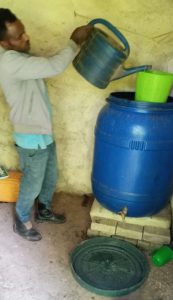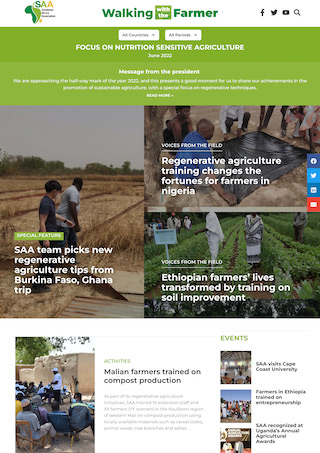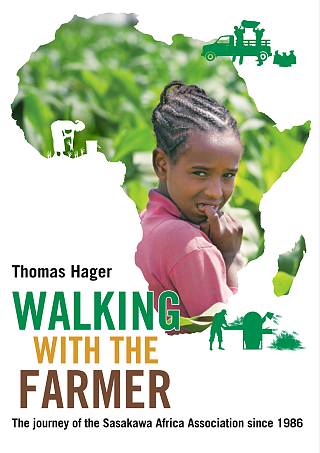Farmers Report Positive Results Using Vermiwash to Control Pests and Diseases

Farmers in the Kokit and Taguba Meskel kebeles of Ethiopia’s Meket District are eager to continue using vermiwash, a bio-pesticide, soil fertilizer and plant growth promoter, following evidenced success in the control of diseases and pests, and enhanced output in wheat production.
Vermiwash is a liquid solution produced from the washed-out mucus secretions of vermiworm mixed with dissolved vermicompost exudate. The composition and quality of vermiwash vary depending on the raw organic matter used for the vermicomposting process, but generally include a rich blend of decomposer bacteria, mucus, vitamins, bioavailable minerals, hormones, enzymes, and antimicrobial peptides.
The Sasakawa Africa Association (SAA) has been promoting vermiwash to suppress diseases and insect pests and improve crop productivity due to its biomolecules and microbes, which have fungicidal and pesticidal effects. This has been especially timely in the Meket District, where insect pests like the cutworm and leaf rust affect the production of wheat at the early growth stage. Due to limited availability and high cost of seed dressing agro-chemicals, farmers often use high seed rates to offset the damage.
 For a change, during the 2023 pre-season training, SAA-trained Extension Agents (EAs) and Subject Matter Specialists at Kokit and Taguba Meskel showed farmers how to prepare and apply vermiwash. After the training, the EAs established vermiwash units in their respective Farmer Training Centers (FTCs). The unit was set using a plastic barrel (350-Lts capacity), containing a 40 cm gravel and sand filter layer (20cm gravel; 20cm sand) at the bottom, and a vermiworm layer with decomposable organic materials on top. Five litres of water were sprinkled daily, and after the 17th day, a brown-colored liquid extract was harvested for use. During the season, 150.25 Lts of vermiwash (74.25 Lts in Taguba Meskel and 76 Lts in Kokit) were produced.
For a change, during the 2023 pre-season training, SAA-trained Extension Agents (EAs) and Subject Matter Specialists at Kokit and Taguba Meskel showed farmers how to prepare and apply vermiwash. After the training, the EAs established vermiwash units in their respective Farmer Training Centers (FTCs). The unit was set using a plastic barrel (350-Lts capacity), containing a 40 cm gravel and sand filter layer (20cm gravel; 20cm sand) at the bottom, and a vermiworm layer with decomposable organic materials on top. Five litres of water were sprinkled daily, and after the 17th day, a brown-colored liquid extract was harvested for use. During the season, 150.25 Lts of vermiwash (74.25 Lts in Taguba Meskel and 76 Lts in Kokit) were produced.
The vermiwash was used for wheat as a seed treatment against cutworm, and foliar application to suppress wheat rust. Each host farmer and members of the community-based seed multiplication associations, across both kebeles, received one liter of vermiwash to treat 15Kgs of wheat seed before planting. Both farmers and EAs reported improved crop establishment in treated fields, as compared to untreated ones.
Furthermore, development agents in the Kokit FTC conducted demonstrations on wheat rust control using a rate of 40 litres/ha of vermiwash solution, compared with 0.5 Lts/ha fungicide (Tilt 250 E.C) on the Danphe wheat variety grown on 100 m2 plots. Both plots were sprayed when the crop was at flowering stage following the onset of leaf rust, and both treatments were found to be effective in controlling and suppressing the disease. Farmers commented that untreated fields were severely affected by rust.
This observation indicates that vermiwash is a promising, cost-effective, accessible, and environment-friendly bio-pesticide for regenerative agriculture. Meanwhile, studies on formulation, optimal rate, and efficacy of vermiwash derived from different materials are imperative to scale up the use of the treatment in sustainable agriculture.
Retrieved from SAA E-Newsletter, issued in April 2024, titled "Focus on Ethiopia"
SAA Publications

E-newsletter
"Walking with the Farmer"
SAA publishes a bimonthly e-newsletter reporting on SAA activities.

SAA history book
"Walking with the Farmer: The journey of the Sasakawa Africa Assoication since 1986"
This book chronicles the history of SAA from its inception to the present.

Annual Report
Annual Report FY2023
Annual Report FY2023 is available here.





